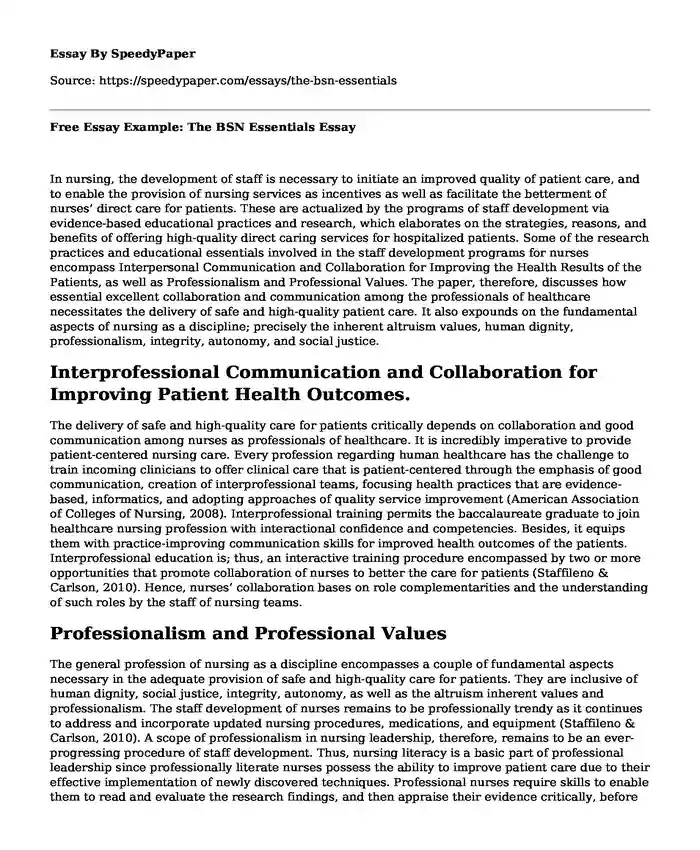
| Essay type: | Process essays |
| Categories: | Professional development Nursing care Interpersonal communication |
| Pages: | 3 |
| Wordcount: | 692 words |
In nursing, the development of staff is necessary to initiate an improved quality of patient care, and to enable the provision of nursing services as incentives as well as facilitate the betterment of nurses’ direct care for patients. These are actualized by the programs of staff development via evidence-based educational practices and research, which elaborates on the strategies, reasons, and benefits of offering high-quality direct caring services for hospitalized patients. Some of the research practices and educational essentials involved in the staff development programs for nurses encompass Interpersonal Communication and Collaboration for Improving the Health Results of the Patients, as well as Professionalism and Professional Values. The paper, therefore, discusses how essential excellent collaboration and communication among the professionals of healthcare necessitates the delivery of safe and high-quality patient care. It also expounds on the fundamental aspects of nursing as a discipline; precisely the inherent altruism values, human dignity, professionalism, integrity, autonomy, and social justice.
Interprofessional Communication and Collaboration for Improving Patient Health Outcomes.
The delivery of safe and high-quality care for patients critically depends on collaboration and good communication among nurses as professionals of healthcare. It is incredibly imperative to provide patient-centered nursing care. Every profession regarding human healthcare has the challenge to train incoming clinicians to offer clinical care that is patient-centered through the emphasis of good communication, creation of interprofessional teams, focusing health practices that are evidence-based, informatics, and adopting approaches of quality service improvement (American Association of Colleges of Nursing, 2008). Interprofessional training permits the baccalaureate graduate to join healthcare nursing profession with interactional confidence and competencies. Besides, it equips them with practice-improving communication skills for improved health outcomes of the patients. Interprofessional education is; thus, an interactive training procedure encompassed by two or more opportunities that promote collaboration of nurses to better the care for patients (Staffileno & Carlson, 2010). Hence, nurses’ collaboration bases on role complementarities and the understanding of such roles by the staff of nursing teams.
Professionalism and Professional Values
The general profession of nursing as a discipline encompasses a couple of fundamental aspects necessary in the adequate provision of safe and high-quality care for patients. They are inclusive of human dignity, social justice, integrity, autonomy, as well as the altruism inherent values and professionalism. The staff development of nurses remains to be professionally trendy as it continues to address and incorporate updated nursing procedures, medications, and equipment (Staffileno & Carlson, 2010). A scope of professionalism in nursing leadership, therefore, remains to be an ever-progressing procedure of staff development. Thus, nursing literacy is a basic part of professional leadership since professionally literate nurses possess the ability to improve patient care due to their effective implementation of newly discovered techniques. Professional nurses require skills to enable them to read and evaluate the research findings, and then appraise their evidence critically, before implementing them on the patient (American Association of Colleges of Nursing, 2008). Direct caring professional nurses are, therefore in a vital position to assert the problems in the medical literature and carry out further inquiries about various clinical practices.
Conclusion
Generally, the development of nursing professionals is necessary to facilitate a boosted quality of patient care, and to make possible, the provision of nursing service as incentives as well as promote the improvement of nurses’ direct care for patients. These are put into practice by the programs of staff development, through evidence-based educational practices and research, which expounds on the techniques, reasons, and importance of offering high-quality direct caring services for patients. Some of the research procedures and educational necessities incorporated in the staff development programs for nurses are inclusive of Interpersonal Communication and Collaboration for Improving the Health Results of the Patients, and Professionalism and Professional Values.
References
American Association of Colleges of Nursing. (2008). The essentials of baccalaureate education for professional nursing practice. 2008 Retrieved from http://www. aacn. nche. Edu/education-resources. BaccEssentials08. pdf. https://www.bc.edu/content/dam/files/schools/son/pdf2/BaccEssentials08.pdf
Staffileno, B. A., & Carlson, E. (2010). Providing direct care nurses research and evidencebased practice information: an essential component of nursing leadership. Journal of Nursing Management, 18(1), 84-89. file:///C:/Users/hp/Downloads/Staffileno%20and%20Carlson%20article.pdf
Cite this page
Free Essay Example: The BSN Essentials. (2023, Oct 11). Retrieved from https://speedypaper.net/essays/the-bsn-essentials
Request Removal
If you are the original author of this essay and no longer wish to have it published on the SpeedyPaper website, please click below to request its removal:
- Theories of Development. Paper Example
- Paper Example: How important is networking?
- Free Essay: The Most Important Piece From the Students' Experiences
- The Meaning and Importance of Performance Management. Essay Example
- Sampling Method and Study Design - Free Essay
- Teenagers' Internet Use: Moral and Psychological Impact - Paper Example
- Evolution - Paper Example
Popular categories




